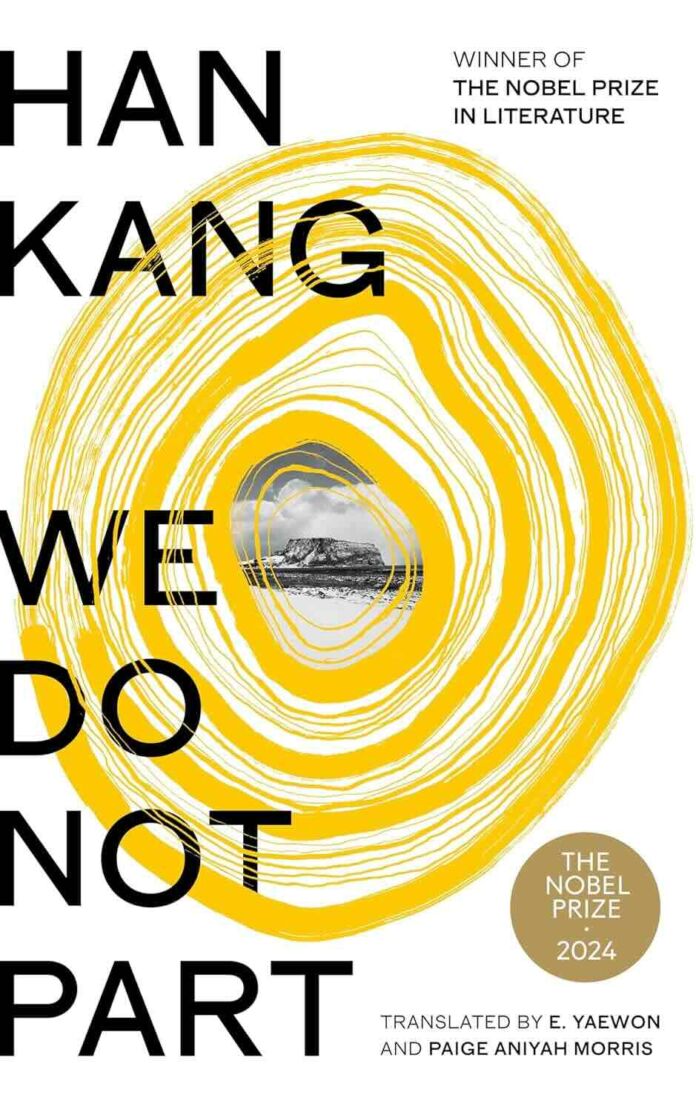Han Kang’s latest masterpiece, We Do Not Part, is a profound exploration of historical trauma, friendship, and the delicate threads that bind past to present. Following her internationally acclaimed works The Vegetarian, Human Acts, and The White Book, Han once again demonstrates her extraordinary ability to weave poetry and prose into a tapestry of devastating beauty.
Narrative Structure and Style
The novel opens deceptively simply: Kyungha receives an urgent message from her friend Inseon, who has severely injured her fingers in a woodworking accident. Inseon’s request—that Kyungha travel to Jeju Island to save her pet bird Ama—sets in motion a journey that becomes both physical and metaphysical. As Kyungha battles a fierce snowstorm to reach Inseon’s house, the narrative unfolds in layers, revealing deeper and more haunting truths with each turn.
Han’s prose, masterfully translated by e. yaewon and Paige Aniyah Morris, maintains its characteristic intensity while achieving new heights of poetic resonance. The translators deserve particular praise for preserving the author’s ability to shift seamlessly between stark realism and dreamlike sequences, capturing the subtle variations in tone that make Han’s writing so distinctive.
Thematic Depth
The novel operates on multiple levels:
- The immediate narrative of friendship and sacrifice
- The historical backdrop of the Jeju Uprising and subsequent massacre
- The metaphysical exploration of memory and trauma
- The examination of how violence echoes through generations
Historical Context
At the heart of the novel lies the devastating history of the Jeju Uprising and its aftermath (1948-1949), during which an estimated 30,000 civilians were killed. Han approaches this historical trauma with characteristic sensitivity, showing how such events reverberate through time, affecting not only those who experienced them directly but subsequent generations as well.
The novel’s treatment of this history is particularly powerful because it focuses on individual stories:
- Inseon’s family history
- The elderly woman’s testimony of massacre at the beach
- The preserved documents and photographs
- The excavation of mass graves
Symbolism and Imagery
Han employs recurring motifs with remarkable effectiveness:
- Snow as both beauty and obliteration
- Birds as symbols of fragility and resilience
- Light and darkness as metaphors for memory and forgetting
- Water in its various forms representing both life and death
The author’s use of snow is particularly masterful, serving as both literal obstacle and metaphorical representation of how history can be both preserved and erased.
Character Development
The relationship between Kyungha and Inseon forms the novel’s emotional core. Their friendship, spanning decades, provides a human scale against which larger historical events are measured. The characters are drawn with subtle complexity:
Inseon’s evolution from:
- A documentary filmmaker to carpenter
- A daughter to caregiver
- A witness to keeper of memory
Kyungha’s journey from:
- Initial reluctance to deep engagement with history
- Physical journey through snow to spiritual awakening
- Observer to participant in bearing witness
Narrative Innovation
Han’s innovative approach to storytelling deserves special mention. The novel’s structure mirrors its themes, with time becoming increasingly fluid as the story progresses. The boundaries between past and present, reality and dream, memory and imagination become deliberately blurred, creating a reading experience that is both challenging and deeply rewarding.
Critical Analysis
The novel’s strengths lie in:
- Han’s precise, poetic prose
- The seamless integration of historical fact with fictional narrative
- The profound exploration of human resilience
- The delicate handling of trauma and memory
Minor criticisms might include:
- The occasionally challenging narrative structure
- Some readers may find the pace deliberately slow
- The metaphysical elements might prove challenging for some
Comparative Context
While We Do Not Part shares thematic concerns with Han’s previous works, particularly Human Acts, it represents a significant evolution in her writing. The novel can be placed in conversation with other works dealing with historical trauma, such as Toni Morrison’s Beloved or W.G. Sebald’s Austerlitz, while maintaining its distinctly Korean perspective.
Translation Quality
The English translation deserves special praise for:
- Maintaining the lyrical quality of Han’s prose
- Preserving the complex layers of meaning
- Successfully conveying cultural nuances
- Keeping the rhythm and flow of the original
Impact and Significance
We Do Not Part stands as a significant contribution to:
- Literature of historical trauma
- Contemporary Korean literature
- The global literary conversation about memory and witnessing
- Understanding of how societies process collective trauma
Final Thoughts
We Do Not Part is a remarkable achievement that confirms Han Kang’s position as one of the most important writers of our time. The novel demonstrates why she was awarded the 2024 Nobel Prize in Literature, showing her ability to confront historical trauma while maintaining deep humanity and artistic excellence.
Recommended for:
- Readers of literary fiction
- Those interested in Korean history
- Fans of poetic prose
- Readers who appreciate complex narrative structures
- Anyone interested in how societies process historical trauma
We Do Not Part is not just a novel about historical events; it’s a profound meditation on how we carry the past within us and how we might find ways to bear witness to unspeakable truths while maintaining our humanity. It’s a work that will resonate long after the final page is turned, inviting multiple readings and ongoing reflection.
The novel stands as a testament to the power of literature to illuminate dark corners of history while celebrating the resilience of the human spirit. It’s a worthy addition to Han Kang’s already impressive body of work and further establishes her as one of the most important voices in contemporary world literature.





